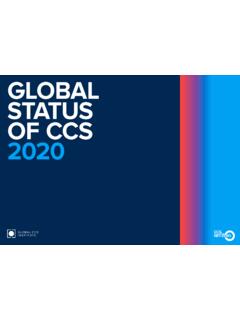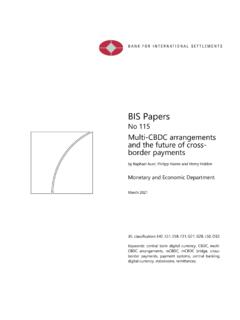Transcription of The International Professional Practices Framework
1 EuropeanUnionInternal Audit Training of TrainersCo-funded byThe International Professional Practices FrameworkJean-Pierre Garitte, CIA, CCSA, CISA, CFEV ienna, 1 February 2018 The International Professional Practices Framework (IPPF)This webinar refers entirely to the International Professional Practices Framework (IPPF) as promulgated by the global Institute of Internal Auditors (IIA).Future users of this webinar materials should always consult with the website of the IIA, as components of the IPPF are subject to periodical is Copyright by The Institute of Internal Auditors, Inc. All rights reservedImportant notice Overview of the IPPF5 The International Professional Practices Framework6 What remained unchanged? Authoritative Professional guidanceprovided by the Institute of Internal Auditors (The IIA) Part of the collective knowledge of the Internal Audit profession (CBOK) Essential elements for the effective delivery of Internal Audit servicesWhat does the IPPF represent?
2 8 IPPF Oversight Council International Federation of Accountants (IFAC) National Association of Corporate Directors (NACD) International Organization of Supreme Audit Institutions (INTOSAI) Organization for Economic Co-operation and Development (OECD) The Institute of Internal Auditors (IIA) The World BankOrganizations represented in the Council:9 What are the components of the IPPF?Mandatory Guidance Mission Core Principles Definition Code of Ethics StandardsRecommended Guidance Implementation Guidance Supplemental Guidance10 Mission of Internal AuditThe Mission of Internal Audit articulates what internal audit aspires to accomplish within an organization. Its place in the IPPF is deliberate, demonstrating how practitioners should leverage the entire Framework to facilitate their ability to achieve the enhance and protect organizational value by providing risk-based and objective assurance, advice and Principles for the Professional Practice of Internal Auditing (1)The Core Principles, taken as a whole, articulate internal audit effectiveness.
3 For an internal audit function to be considered effective, all Principles should be present and operating effectively. How an internal auditor, as well as an internal audit activity, demonstrates achievement of the Core Principles may be quite different from organization to organization, but failure to achieve any of the Principles would imply that an internal audit activity was not as effective as it could be in achieving its internal audit s Principles for the Professional Practice of Internal Auditing (2) competence and due Professional objective and free from undue influence (independent). with the strategies, objectives, and risks of the appropriately positioned and adequately Principles for the Professional Practice of Internal Auditing (3) quality and continuous risk-based insightful, proactive, and organizational of Internal AuditingThe Definition of Internal Auditing states the fundamental purpose, nature, and scope of internal auditing is an independent, objective assurance and consulting activity designed to add value and improve an organization's operations.
4 It helps an organization accomplish its objectives by bringing a systematic, disciplined approach to evaluate and improve the effectiveness of risk management, control, and governance of Ethics (1)The purpose of The Institute's Code of Ethics is to promote an ethical culture in the profession of internal auditing. The Code of Ethics states the principles and expectations governing behavior of individuals and organizations in the conduct of internal auditing. It describes the minimum requirements for conduct, and behavioral expectations rather than specific of Ethics (2)The Institute's Code of Ethics extends beyond the Definition of Internal Auditing to include two essential components: 1. Principlesthat are relevant to the profession and practice of internal auditing. 2. Rules of Conduct that describe behavior norms expected of internal auditors.
5 These rules are an aid to interpreting the Principles into practical applications and are intended to guide the ethical conduct of internal auditors. "Internal auditors" refers to Institute members, recipients of or candidates for IIA Professional certifications, and those who perform internal audit services within the Definition of Internal Auditing. 17 Code of Ethics (3)1. IntegrityThe integrity of internal auditors establishes trust and thus provides the basis for reliance on their ObjectivityInternal auditors exhibit the highest level of Professional objectivity in gathering, evaluating, and communicating information about the activity or process being examined. Internal auditors make a balanced assessment of all the relevant circumstances and are not unduly influenced by their own interests or by others in forming judgmentsInternal auditors are expected to apply and uphold the following principles:3.
6 ConfidentialityInternal auditors respect the value and ownership of information they receive and do not disclose information without appropriate authority unless there is a legal or Professional obligation to do CompetencyInternal auditors apply the knowledge, skills, and experience needed in the performance of internal audit Standards (1)Purpose of the Standards is adherence with the mandatory elements of the International Professional Practices Framework . a Framework for performing and promoting a broad range of value-added internal auditing services. the basis for the evaluation of internal audit performance. improved organizational processes and operations. 19 The Standards (2)Components of the of basic requirements for the Professional practice of internal auditing and for evaluating the effectiveness of performance, which are internationally applicable at organizational and individual (attached to specific standards) Standards (3)
7 The Standards comprise two main Standards address the attributes of organizations and individuals performing internal Standards describe the nature of internal auditing and provide quality criteria against which the performance of these services can be Standards expand upon the Attribute and Performance Standards by providing the requirements applicable to assurance or consulting Attribute Standards1000 Purpose, Authority, and Responsibility1100 Independence and Objectivity1200 Proficiency and Due Professional Care1300 Quality Assurance and Improvement Program22 The Performance Standards2000 Managing the Internal Audit Activity2100 Nature of Work2200 Engagement Planning2300 Performing the Engagement2400 Communicating Results2500 Monitoring Progress2600 Communicating the Acceptance of RisksChanges to the Standards24 Main Characteristics of Changes to the of new changes to existing changes, including interpretation, to existing to principles is emphasized(QAR) of new of New Standard 1112: Chief Audit Executive Roles Beyond Internal of New Standard Internal audit may provide assurance services where they had previously performed consulting services.
8 261112 Chief Audit Executive Roles Beyond Internal AuditingInterpretation:The chief audit executive may be asked to take on additional roles and responsibilities outside of internal auditing, such as responsibility for compliance or risk management activities. These roles and responsibilities may impair, or appear to impair, the organizational independence of the internal audit activity or the individual objectivity of the internal auditor. Safeguards are those oversight activities, often undertaken by the board, to address these potential impairments, and may include such activities as periodically evaluating reporting lines and responsibilities and developing alternative processes to obtain assurance related tothe areas of additional Lines of Defense Model(as conceived by the ECIIA& FERMAin Guidance on the 8th EU Company Law and endorsed in the so-named Position Paperissued by The IIA in Jan.)
9 2013)28 Balancing Internal Audit s Roles291130 Impairment to Independence or ObjectivityIf independence or objectivity is impaired in fact or appearance, the details of the impairment must be disclosed to appropriate parties. The nature of the disclosure will depend upon the :Impairment to organizational independence and individual objectivity may include, but is not limited to, personal conflict of interest, scope limitations, restrictions on access to records, personnel, and properties, and resource limitations, such as determination of appropriate parties to which the details of an impairment to independence or objectivity must be disclosed is dependent upon the expectations of the internal audit activity s and the chief audit executive s responsibilities to senior management and the board as described in the internal audit charter, as well as the nature of the to Independence or Internal auditors must refrain from assessing specific operations for which they were previously responsible.
10 Objectivity is presumed to be impaired if an internal auditor provides assurance services for an activity for which the internal auditor had responsibility within the previous Assurance engagements for functions over which the chief audit executive has responsibility must be overseen by a party outside the internal audit internal audit activity may provide assurance services where it had previously performed consulting services, provided the nature of the consulting did not impair objectivity and provided individual objectivity is managed when assigning resources to the engagement. 31 Major changes to existing to Standard 2050: Coordination and Coordination and Reliance (1)The chief audit executive should share information, coordinate activities, and consider relying upon the work of other internal and external assurance and consulting service providers to ensure proper coverage and minimize duplication of efforts.

